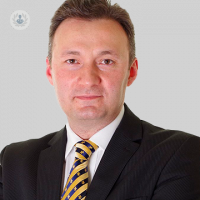Genetic testing for hereditary breast cancer: Its aim, patient eligibility and the results process
Written by:If you're concerned about the possibility of having hereditary breast cancer, it's possible to undergo a genetic test to determine how likely you are to have it. However, there are factors involved that may lead to some patients being more eligible than others.
Discover more about these factors, alongside the aim of genetic testing for breast cancer and the results process, in this informative interview with Mr Hazem Khout, Nottingham-based consultant oncoplastic and reconstructive surgeon.

How common is hereditary breast cancer?
Hereditary breast cancers aren't very common. Out of 100 breast cancer patients, we would expect two to three to have hereditary breast cancer. Hereditary breast cancer is defined as breast cancer that has happened because of genetic default, problem or mutation.
It can be more common in some geographical or demographic groups, or in certain areas or in families that already have a lot of genetic issues and problems. Generally speaking, about two to three per cent of all breast cancers are genetically related.
What are the common genetic defaults that can cause hereditary breast cancer?
There are a number of genes that potentially increase the risk of having breast cancer. The most common ones are:
- BRCA1;
- BRCA2;
- There's also the PALB2;
- And other genes.
Altogether there's nine genes that can increase the chance of having breast cancer. Most of the genetic testing kits will test for these nine genes but specifically for the BRCA1, BRCA2 and PALB2.
What's the aim of genetic testing for breast cancer?
The aim of genetic testing for breast cancer is to identify whether the patient - the lady or the gentleman - carries the genetic mutation that makes them a higher risk of having breast cancer in the future. Some genetic disorders or genes such as the BRCA1 and BRCA2 can also carry a risk in having ovarian cancer. So it's not just preventing breast cancer but also ovarian cancer.
Some of the tests are done for patients who have already been diagnosed with breast cancer, because of their family history, or because of the type of cancer they carry. Others are tested because of their family history and they don't have a breast cancer diagnosis at the time of the testing. So, different groups of patients equal a different aim for genetic testing.
Who is eligible for genetic testing for breast cancer?
Effectively all patients can have a genetic test for breast cancer privately. However, in the NHS, it's different. The aim of having the gene testing is actually to identify those with a high risk of developing breast cancer. That depends of the number of relatives they have with breast or ovarian cancer, and how close these relatives are to them.
In most breast units, there is a family history clinic or service where the patient can be asked about all the relatives they have with breast, ovarian and other cancers, including what generation they are, how closely related they are to the patient, and then assess the risk. If the risk is quite high, then breast genetic testing can be offered.
Also, genetic testing for breast cancer is offered to young patients who are diagnosed with breast cancer. Certain breast cancers such as triple negative breast cancer in patients younger than 60, is also an indication to having a genetic breast cancer.
What results can patients expect after a genetic test for breast cancer?
There are three common scenarion for genetic test for breast cancer results.
The first one is to have a negative result. The second scenario is to have a pathogenic variant which means a positive result for one of the gene mutations. This means that the patient has a higher risk of having breast cancer, which can be discussed with the patient, of course. Also, the relatives of this patient - it depends how closely they are related - they might have a higher risk of having breast or ovarian cancer in the future.
The third scenario is identifying a variant which doesn't really have a clear significance at the moment. We call it VUS, or Variant of Unknown Signficance. That means these changes are not known yet and whether they can actually be linked to having breast cancer or not. Only time will tell us whether these will turn into pathogenic variations that need to be actioned as non-pathogenic variants.
It's very important to understand this and it's very important to discuss this at time of consultation, in genetic counseling, with the patient. Because dealing with the unknown might sometimes be an issue and the patient needs to be prepared if this is the result of the genetic testing.
If you're considering genetic testing for breast cancer, make an appointment with Mr Khout via his Top Doctors profile.


